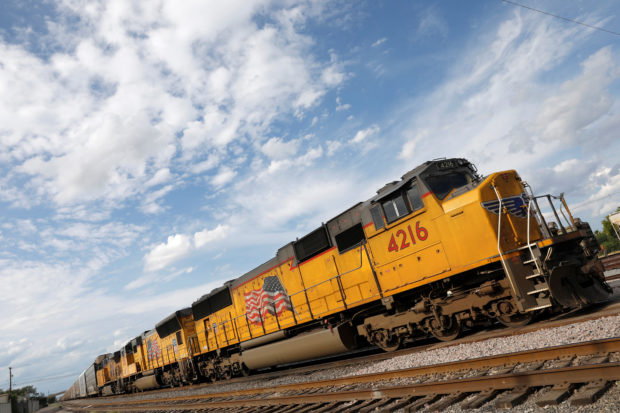Biden administration races to avert rail shutdown, smaller union rejects deal

A cargo train is seen near the border between the U.S. and Mexico, in Laredo, Texas. REUTERS/Carlos Jasso/File photo
DETROIT/LOS ANGELES -Biden administration officials, keen to avert a potential rail shutdown that could disrupt cargo shipments and impede food and fuel supplies, hosted labor contract talks on Wednesday as one of the smaller unions involved in the dispute rejected a deal and Amtrak canceled long-distance passenger trips.
Railroads including Union Pacific, Berkshire Hathaway’s BNSF and Norfolk Southern have until a minute after midnight on Friday to reach deals with three holdout unions representing about 60,000 workers before a work stoppage affecting freight and Amtrak could begin.
Talks between labor unions and railroads were continuing late on Wednesday at the U.S. Labor Department overseen by Secretary Marty Walsh, while Transportation Secretary Pete Buttigieg said it was urgent to reach a deal to avoid a shutdown.
“Everybody is going to have to move a little in order to get a deal done,” Buttigieg told reporters on the sidelines of the Detroit auto show.
A union representing about 4,900 machinists, mechanics and maintenance personnel said on Wednesday its members voted to reject its tentative deal.
Article continues after this advertisementRailroads have offered significant pay increases. Three of 12 unions, representing about half of the 115,000 workers affected by the negotiations, are holding out for better working conditions. Two of those 12 unions, representing more than 11,000 workers, have ratified deals, the National Carriers’ Conference Committee (NCCC), which is bargaining on behalf of railroads, said on Wednesday.
Article continues after this advertisementUnions are enjoying a surge of public and worker support in the wake of the pandemic, when “essential” employees risked COVID-19 exposure to keep goods moving and employers reaped hefty profits, labor and corporate experts say.
A shutdown could freeze almost 30 percent of U.S. cargo shipments by weight, stoke inflation, cost the U.S. economy as much as $2 billion per day and unleash a cascade of transportation woes affecting the U.S. energy, agriculture, manufacturing and retail sectors.
White House spokeswoman Karine Jean-Pierre told reporters aboard Air Force One that a shutdown of the freight rail system would be an “unacceptable outcome for our economy and the American people and all parties must work to avoid just that.”
President Joe Biden’s administration has begun making contingency plans to ensure deliveries of critical goods in the event of a shutdown.
The stakes are high for Biden, who has vowed to rein in soaring consumer costs ahead of November elections that will determine whether his fellow Democrats maintain control of Congress.
“Unless they reach a breakthrough soon, rail workers will go on strike this Friday. If you don’t think that will have a negative impact on our economy … think again,” said U.S. Senator John Cornyn, a Republican and Biden critic.
Is Congress stepping in?
Senator Bernie Sanders late on Wednesday objected to a Republican bid to unanimously approve legislation to prevent a rail strike, noting the profits the rail industry has made.
If agreements are not reached, employers could also lock out workers. Railroads and unions may agree to stay at the bargaining table, or the Democratic-led U.S. Congress could intervene by extending talks or establishing settlement terms.
House of Representatives Speaker Nancy Pelosi said it was not clear whether Congress would step in, noting that the main issue is a lack of sick leave for workers.
“We’d rather see negotiations prevail so there’s no need for any actions from Congress,” Pelosi added.
Amtrak, which uses tracks maintained by freight railways, said it would cancel all long-distance trips on Thursday.
Industry groups continue to call on Congress to help, saying a rail shutdown would hit as grain farmers prepare for harvest and consumers gear up for winter weather and Christmas holiday shopping.
Railroad customers have long complained that rail service is expensive and unreliable, with the industry’s decision to halt shipments of hazardous materials, crude oil and refrigerated food and general merchandise ahead of a potential shutdown making matters worse.
Rail hubs in Chicago and Dallas were already clogged and suffering from equipment shortages before the contract showdown. Those bottlenecks are backing up cargo at U.S. seaports by as much as a month. And, once cargo gets to rail hubs in locations such as Chicago, Dallas, Kansas City and Memphis, Tennessee, it can sit another month or longer.
Package delivery company United Parcel Service, one of the largest U.S. rail customers, and U.S. seaports said they are working on contingency plans.
Meanwhile, factory owners are fretting about idling machinery while automakers worry that a shutdown could extend vehicle buyer wait times. Elsewhere, food and energy companies warn that additional service disruptions could create even sharper price hikes